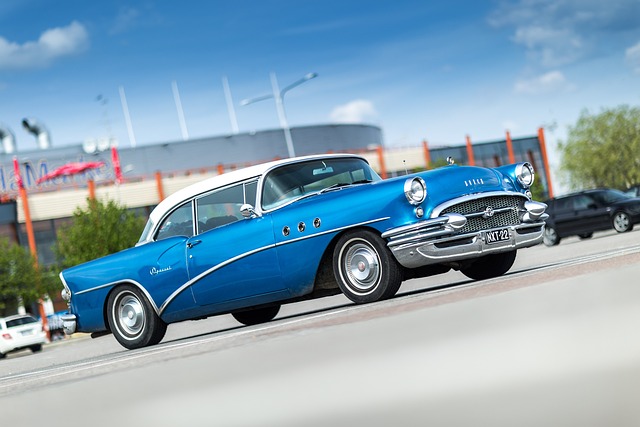Looking to register your car in California? This comprehensive guide walks you through every step, from understanding the DMV’s VIN verification process to gathering required documents. We provide a detailed, step-by-step registration guide, highlight common mistakes to avoid, and offer aftercare tips for maintaining your registered vehicle in the Golden State. By following these insights, you’ll ensure a smooth car registration experience.
- Understanding the DMV VIN Verification Process
- Gathering Necessary Documents for Car Registration
- Step-by-Step Guide to Registering Your Vehicle in California
- Common Mistakes to Avoid During Registration
- Aftercare and Maintaining Your Registered Vehicle in CA
Understanding the DMV VIN Verification Process

When registering a car in California, understanding the DMV VIN verification process is crucial. The Department of Motor Vehicles (DMV) requires a vehicle identification number (VIN) inspection to ensure that your car meets safety and emissions standards. This involves verifying key components like the engine, transmission, brakes, and other critical systems using the unique VIN code etched into every vehicle.
A mobile vin verifier or mobile vin inspection can simplify this process, as these services bring the verification to you. Instead of visiting a DMV location, a professional will come to your convenience—whether it’s at home or work—to conduct a thorough check, saving you time and effort. This alternative approach is especially beneficial for folks with busy schedules or accessibility concerns.
Gathering Necessary Documents for Car Registration

Before heading to the California Department of Motor Vehicles (DMV) for car registration, ensure you gather all the essential documents. The process begins with verifying your vehicle’s identity through a crucial step known as DMV VIN verification. This involves checking the Vehicle Identification Number (VIN), which is unique to each car and can be found on the dashboard or engine bay. A mobile vin inspection or using a mobile vin verifier can facilitate this initial check, ensuring that your vehicle meets all legal requirements before registration.
Along with the VIN, you’ll need other important paperwork such as proof of ownership (a title document), valid insurance documents, and identification like a driver’s license. It is also beneficial to have any relevant repair or service records handy, especially if your car has been previously owned, as these might impact registration. Proper preparation will streamline the registration process at the DMV, making it quicker and easier for you.
Step-by-Step Guide to Registering Your Vehicle in California

Registering a car in California involves several steps, but with the right preparation, it can be a straightforward process. Start by gathering all necessary documents, including your vehicle’s registration certificate from the previous state, proof of insurance, and identification documents like a driver’s license or passport. Next, visit your local California Department of Motor Vehicles (DMV) office, or consider using their online services for some tasks, such as paying fees and submitting applications.
One crucial step in the registration process is the DMV vin verification. This involves checking the vehicle’s unique identifier, known as the Vehicle Identification Number (VIN), against the records to ensure it matches the details provided. You can facilitate this process with a mobile vin verifier or undergo a mobile vin inspection to streamline your trip to the DMV. Ensure all information is accurate and complete to avoid delays.
Common Mistakes to Avoid During Registration

When registering your car in California, it’s crucial to avoid common mistakes that can cause delays or even rejection. One of the most frequent errors is failing to undergo a proper DMV VIN verification. The Vehicle Identification Number (VIN) inspection is a critical step in the registration process, ensuring that your vehicle matches the details on record and helping to prevent fraud. Always ensure you have accurate documentation, including proof of ownership and insurance, before heading to the DMV.
Another mistake to steer clear of is not utilizing available resources for convenience. Consider scheduling a mobile VIN inspection or mobile VIN verification service, especially if you’re busy or have difficulty transporting your vehicle. These services bring the necessary expertise directly to you, saving time and effort. By avoiding these pitfalls, you’ll streamline the registration process and ensure a smooth experience.
Aftercare and Maintaining Your Registered Vehicle in CA

After registering your vehicle with the DMV in California, proper maintenance and aftercare are essential to ensure a smooth driving experience and compliance with state regulations. One crucial aspect is regular vehicle inspections, which can be easily accomplished with a mobile VIN verification service. This process allows you to check your car’s history, identify potential issues, and keep records of all inspections digitally.
By utilizing a mobile vin inspection tool, you can verify that your vehicle meets California’s safety standards and emissions requirements. Regular maintenance, including timely oil changes, tire rotations, and brake checks, is vital to prolonging your car’s lifespan and ensuring reliable performance. Remember, keeping your registration up-to-date with accurate records of maintenance and inspections will help avoid future issues and fines related to vehicle compliance in CA.
Registering a car in California involves several straightforward steps, beginning with understanding the DMV’s VIN verification process. Ensure you gather all necessary documents, including proof of insurance and ownership. Follow our step-by-step guide to complete the registration smoothly. Remember to avoid common mistakes like missing paperwork or incorrect information. Once registered, proper vehicle maintenance and aftercare are crucial to comply with California regulations. Stay informed about annual renewals and inspections to keep your vehicle legally roadworthy.
